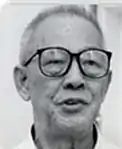Lee Siew Choh
Dr. Lee Siew Choh (simplified Chinese: 李绍祖; traditional Chinese: 李紹祖; pinyin: Lǐ Shàozǔ; 1 November 1917 – 18 July 2002) was a Singaporean politician and medical doctor. Initially a member of the People's Action Party (PAP), he became a leader of the breakaway faction of Barisan Sosialis (BS) in 1961. After the BS merged with the Workers' Party (WP) in 1988, Lee stood as a WP candidate in the 1988 election and became Singapore's first Non-constituency Member of Parliament (NCMP) due to his best performance among the opposition candidates. He served as the NCMP from September 1988 to August 1991.
Dr. Lee Siew Choh | |
|---|---|
 | |
| Member of the Singapore Parliament for Queenstown | |
| In office 30 May 1959 – 21 September 1963 | |
| Preceded by | Lee Choon Eng |
| Succeeded by | Jek Yeun Thong |
| Non-constituency Member of Parliament | |
| In office 16 September 1988 – 14 August 1991 | |
| Personal details | |
| Born | 1 November 1917 Kuala Lumpur, British Malaya |
| Died | 18 July 2002 (aged 84) Singapore |
| Cause of death | lung cancer |
| Resting place | Mount Vernon Sanctuary, Singapore |
| Citizenship | Singaporean |
| Nationality | Malayan |
| Political party | Workers' Party (1988–1997) |
| Spouse(s) | Kathleen Fam (m. 1943–2002) |
| Children |
|
| Mother | Yim Kam |
| Father | Lee Fook Chuen |
| Residence | Singapore |
| Alma mater | Victoria Institution King Edward VII College of Medicine |
| Occupation | doctor, politician |
Biography
Lee was born in Kuala Lumpur and was educated at Victoria Institution. He came to Singapore in 1934 and was trained as a medical doctor at King Edward VII College of Medicine. After graduating in 1942, he joined Kandang Kerbau Hospital as a doctor. He married a volunteer nurse Kathleen Fam Yin Oi (1919 – 20 April 2018) in 1943 during the Japanese occupation of Singapore, he was later sent to work as a medical officer at the Thai-Burmese border for two years, where the Death Railway was constructed.
Lee served in Singapore's Legislative Assembly as a representative of the PAP following the 1959 election. In 1960 he served as the Parliamentary Secretary for Home Affairs. In 1961, Lee and 13 other members of the assembly broke away from the PAP and formed the Socialist Front. Lee was noted for his pro-leftist stance and oratory skills. In 1961, he made the longest speech in the history of Singapore's Legislative Assembly which lasted seven hours on the subject of Singapore's proposed merger with Malaya. Lee led the party in the 1963 elections, in which they won 13 of the 51 seats.
The Socialist Front was Singapore's main opposition party at the time of the country's independence in 1965. But the party boycotted the first post-independence general election in 1968, allowing the PAP to win all 51 of the seats in Parliament. The Socialist Front never managed to regain a significant role in Singapore's political scene after this, and in 1988, the party merged with the Workers' Party.[1]
At the 1988 general election, Lee stood as a Workers' Party candidate in the Eunos Group Representation Constituency along with fellow party members Francis Seow and Mohd Khalit bin Mohd Baboo. They lost very narrowly to the PAP's team in the constituency by 49.1% of the votes to 50.9%. Only one opposition MP was returned to Parliament at that election (Chiam See Tong of the Singapore Democratic Party). As the Workers' Party's team in Eunos had garnered a higher percentage of the vote than any other opposition losing candidates, the party was eligible to nominate two members of its team from Eunos to become Non-constituency MPs. The party had refused to nominate NCMPs in the past, but this time they nominated Lee and Seow to become NCMPs. Seow was subsequently accused of espionage and fled to the United States before he could take up his NCMP seat. But Lee became Singapore's first-ever NCMP,[2] serving until the 1991 general election. In Parliament, he raised several issues, including the Internal Security Act, living costs and welfare.
Lee again stood in Eunos GRC at the 1991 general election. He and fellow party members Jufrie Mahmood, Neo Choon Aik and Wee Han Kim again lost narrowly to the PAP's team by 47.6% of the votes to 52.4%. However no NCMP seats were offered following that election as the opposition parties won a combined total of four elected seats. His eldest son Victor Lee Yew Kwong died in 1992.
Lee left the Workers' Party in 1996, citing differences with the party's leader, Joshua Benjamin Jeyaretnam.
Lee died of lung cancer on 18 July 2002.[3][4] He leaves behind his wife Kathleen Fam, two sons, Peter Lee Yew Chung and David Lee Yew Keong, and a daughter, Lee Yu Lian.[5][6]
See also
References
- "He's trying to rewrite history". Singapore Press Holdings. Archived from the original on 6 July 2015. Retrieved 8 January 2015.
- "Lee Siew Choh, Dr". GOVERNMENT OF SINGAPORE. Archived from the original on 12 January 2015. Retrieved 8 January 2015.
- "Lee Siew Choh". National Library Board. Retrieved 8 January 2015.
- Seow, Francis T. "Tribute to Dr Lee Siew Choh 1917-2002". Retrieved 8 January 2015.
- "Dr. Lee Siew Choh has left us". Think Centre. Retrieved 8 January 2015.
- Singapore, National Library Board. "Lee Siew Choh | Infopedia". eresources.nlb.gov.sg. Retrieved 2018-06-13.
External links
| Political offices | ||
|---|---|---|
| Parliament of Singapore | ||
| Preceded by Lee Choon Eng |
Member of Parliament for Queenstown 1959 – 1963 |
Succeeded by Jek Yeun Thong |
| First New office |
Non-Constituency Member of Parliament 1988 – 1997 |
Vacant Title next held by J.B. Jeyaretnam (1997 – 2001) |